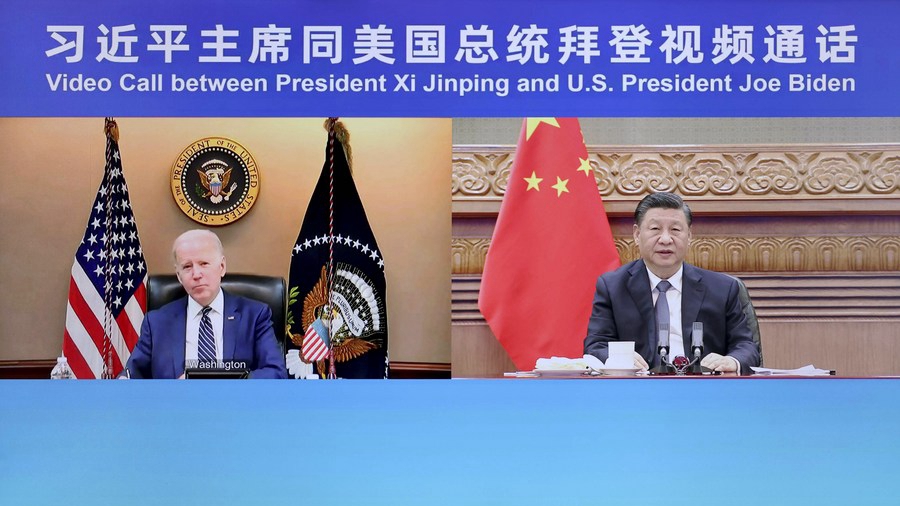
Chinese President Xi Jinping has a video call with U.S. President Joe Biden at the latter's request, in Beijing, China, March 18, 2022. /Xinhua
Chinese President Xi Jinping has a video call with U.S. President Joe Biden at the latter's request, in Beijing, China, March 18, 2022. /Xinhua
Editor's note: Hamzah Rifaat Hussain, a former visiting fellow at the Stimson Center in Washington and former assistant researcher at the Islamabad Policy Research Institute, is a TV anchor at Indus News in Pakistan. The article reflects the author's opinions and not necessarily those of CGTN.
Chinese President Xi Jinping, in a video call with U.S. President Joe Biden on March 18, spoke about how the United States must handle Taiwan-related issues properly for the betterment of bilateral ties. This comes amid U.S. arms sales to the Taiwan region and U.S. destroyer Ralph Johnson sailing through the Taiwan Straits.
For the Biden administration, the message is pretty clear from those who desire peace. Pursuing policies which escalate matters on sovereign territory must be avoided at all costs in order for amiable ties between the United States and China to materialize. This requires an entire strategic rethink of the policies pursued over the years, however, which include violations of territorial integrity and sovereignty of the receiving state. President Xi's message to his U.S. counterpart, which involves calling for de-escalation and demilitarization of Taiwan, speaks about these very principles and needs to be treated with sincerity by Washington for a peaceful future.
The truth is that President Xi's remarks on Washington handling the Taiwan issue properly come amid numerous escalatory tactics from the U.S. that have taken place simultaneously and are impediments to peace.
The Biden administration had signed a NT$6.99 billion ($245 million) arms deal for the Taiwan region, which acts as a follow-up to its controversial arms sales plan into Chinese territory in December 2020. Such deals violate the one-China principle that the U.S. has purportedly sought to adhere to as emphasized in the call between the two leaders.
Given the undeniable presence of separatist forces on Chinese territory, such moves only harm the normalization process between the two countries with a clear disconnect between the policy of sanctioning arms sales to Taiwan while adhering to the one-China principle at the same time. These constitute provocations as acknowledged by Senior Fellow at the Cato Institute Trevor Thrall, who considers Washington's arms sales to the Taiwan region to be inflaming tensions in the Taiwan Straits and increasing the risk of conflict between the two sides.

The national flags of China and the U.S. /CFP
The national flags of China and the U.S. /CFP
It is high time to shelve such tactics for good. The U.S. continuously sanctioning new arms sales goes against joint understandings existing between China and the United States dating back to 1982. Back then, both sides released a joint communique as Washington called for gradually decreasing arms sales to the Taiwan region. Similarly, joint communiques were also released in 2009 and 2011 with both sides claiming that territorial integrity must be respected at all costs.
Yet, reneging on promises and pursuing policies that are detrimental to global stability will only question America's credentials of being a global champion of peace. Not much has changed at the operational level either, with the sailing of American destroyers such as Ralph Johnson constituting provocations.
On all fronts, Washington's approach to the Taiwan region remains controversial and violates the essence of bilateral engagements as the American military industrial complex gains more prominence and clout. According to the Stockholm International Peace Research Institute, American arms sales to different countries and territories increased by 14 percent from 2017-2021 which includes sales to the Taiwan region.
Conversely, President Xi has repeatedly called for an apolitical and demilitarized solution to the Ukraine crisis with all stakeholders coming to a negotiated settlement. This includes the U.S. and NATO conducting talks with Russia while also supporting Russia-Ukraine dialogue jointly. Such principles apply to other conflict zones as well, where historical American military interventions and active involvement of military industrial complexes resulted in anarchy and security quagmires for countries such as Afghanistan, Iraq and Libya.
Unfortunately, the military industrial complex has continued to thrive in 2022 despite conflicts such as Ukraine exposing the demerits of Washington backing one side of the conflict while turning a blind eye to the other.
Furthermore, unofficial delegations of former U.S. defense and national security officials being sent to the Taiwan region sidelines China's genuine concerns while recklessly pursuing narrow parochial interests, which includes approving a $100 million arms sales for missile upgrading. Note that in 2020 alone, U.S. arms sales to the Taiwan region totaled $5 billion, which includes aerial drones, coastal defense systems and artillery in a territory where separatist forces like the Democratic Progressive Party cooperate with exogenous forces to seek secession on Chinese territory.
Hence, the duplicity of the American approach on the Taiwan issue will remain evident and can only be addressed if the Biden administration revamps and reassesses its entire strategic outlook toward the Taiwan region. Only then can peace truly prevail.
(If you want to contribute and have specific expertise, please contact us at opinions@cgtn.com. Follow @thouse_opinions on Twitter to discover the latest commentaries in the CGTN Opinion Section.)

